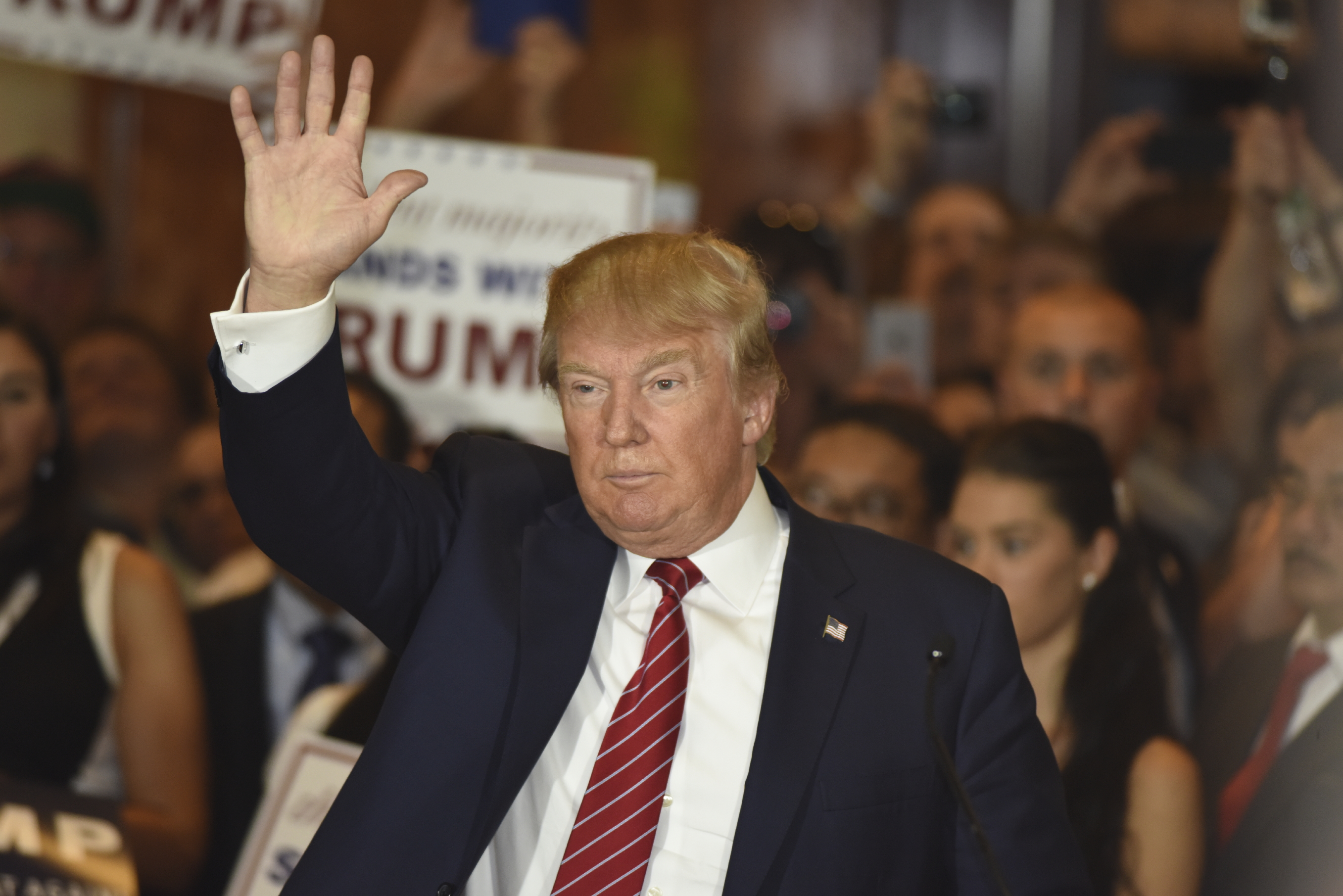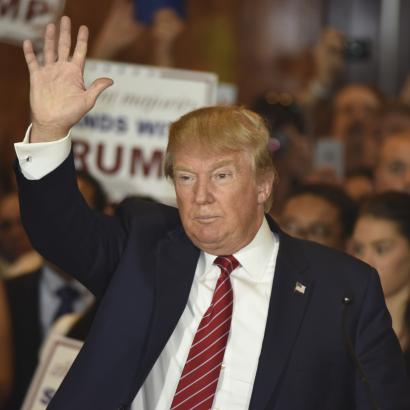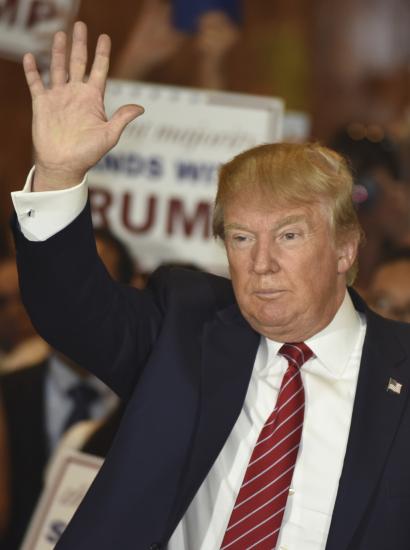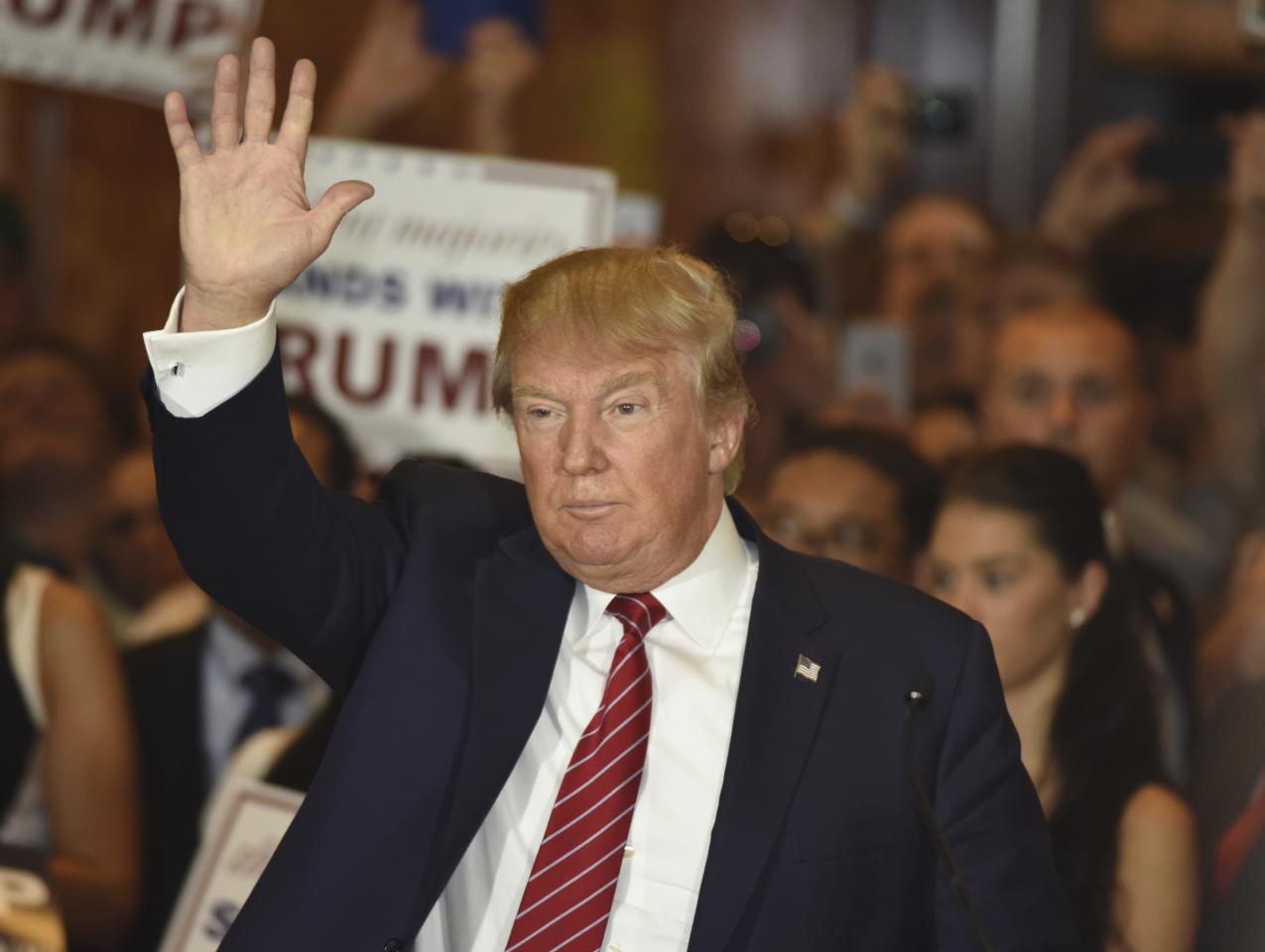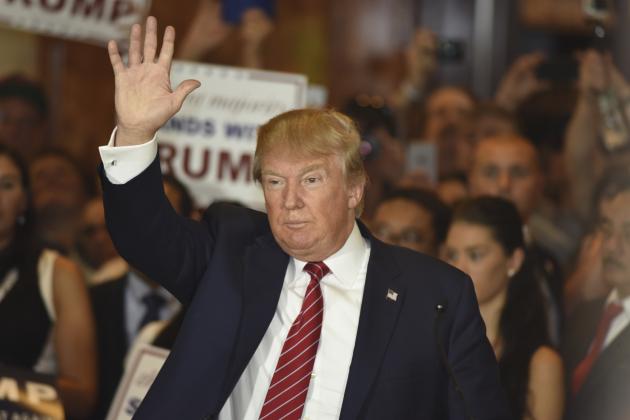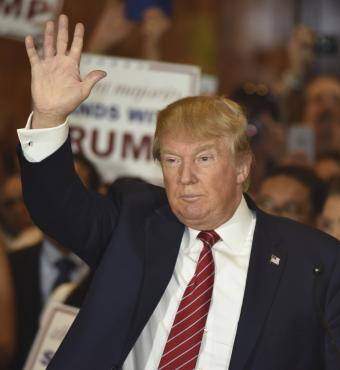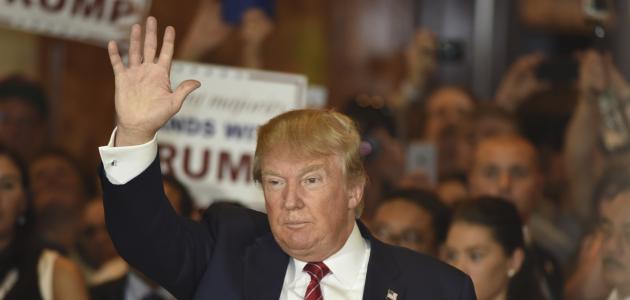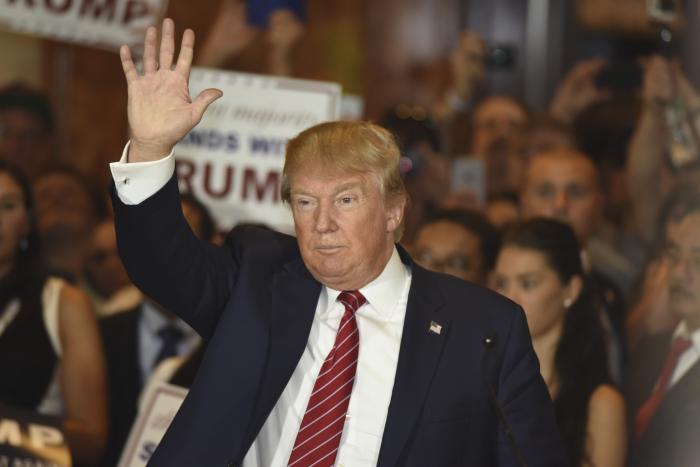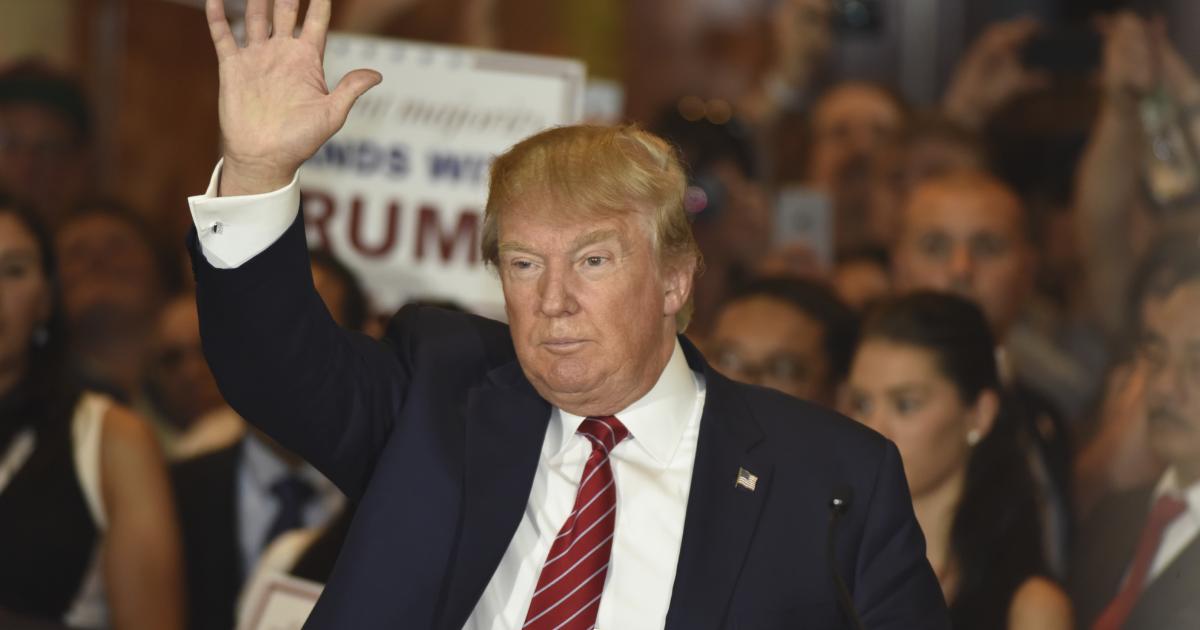- Politics, Institutions, and Public Opinion
If Donald Trump manages to curb most of his more outrageous outbursts by November, most Republicans who would have preferred that he did not receive the nomination will probably hold their noses and vote for him.
How could that be when a profane Trump has boasted that he would limit Muslim immigration into the United States, talked cavalierly about torturing terrorist suspects and executing their relatives, promised to deport all eleven-million Mexican nationals who are residing illegally in the U.S., and threatened a trade war with China by slapping steep tariffs on their imports?
A number of reasons come to mind.
First, Trump stays in the news not just by taking extreme positions, but also by taking extreme positions on issues that are already extreme. When Mexico prints comic books advising its own citizens on how to enter the U.S. illegally, when the major illegal-alien lobbying group is called The National Council of La Raza (“The Race”), and when major U.S. cities, in Confederate-style, declare themselves “sanctuaries” in which U.S. federal immigration law does not apply, then we long ago entered zones of extremism.
Of course, Trump would be wiser to become both more specific and reasonable about solutions to illegal immigration. “Making Mexico pay for the wall” could be finessed not by a trade war, but perhaps by slapping surcharges on remittances sent to Mexico, at higher rates for those in the U.S. who could not prove legal residency. Deportation certainly sounds like a reasonable punishment for the likely more than 1 million illegal aliens who either have committed serious crimes inside the United States or who have no history of being employed—then, once the border is secure, he could propose granting green card status to the illegal aliens who are employed, long-time residents, without criminal convictions, and willing to pay a fine and learn English.
Trump sounds crazy—and dangerous—in his idiotic idea to ban entry into the U.S. on the basis of religion. But is that inanity any less extreme than the administration’s European-style wish to welcome in tens of thousands of mostly young males from the war-torn Middle East without any proper method of identification and audit—at a time of spikes in radical Islamic terrorism in the West? Again, Trump cannot predicate immigration on the basis of religion, but he certainly could place a temporary moratorium of all immigration from particular Middle East countries like Syria, Iraq, Yemen, and Libya, in the way that we do not open our arms to mass influxes of Iranians and North Koreans.
Trump was bashed for suggesting NATO’s tenure is nearing an end—again another ridiculous and dangerous idea. But that trial balloon remains an unhinged corrective to the present unhinged nature of the alliance, in which few members honor their contractual defense spending obligations, and the alliance has both expanded far beyond anything that its founders envisioned, and conducted optional and sometimes failed operations abroad that had nothing to do with trans-Atlantic security. During the Cold War, we sometimes forgot that NATO members occasionally allowed fly-over rights to Soviet Union air lifts headed to the Middle East, while denying fellow NATO member the United States the use of European NATO air space to resupply Israel.
Many conservatives tune out Trump’s adolescent solutions, but not necessarily the haywire issues he has raised. Most believe that he will back down from his original, headline-grabbing positions, and eventually offer more studied and reasonable solutions to an ignored problem that otherwise might not have been aired. And though the results may not be what his supporters have cheered on in rallies or what his critics have hoped for, they will, to many Republican voters, be preferable to President Obama’s current and Hillary Clinton’s future positions. Ignoring candidate Trump’s crude bombast for conservatives is analogous to liberals tuning out Obama’s campaign calls for supporters to take their knives to a gun fight or to get in their opponents’ faces, or his arrogant put-downs of lower middle-class Pennsylvanians or his flat-out prevarications about his relationship with mentor and personal pastor, the racist and anti-Semitic Rev. Jeremiah Wright. Trump’s memoirs are often vulgar; Obama’s largely fictional. Trump’s selfish womanizing was consensual; former President Bill Clinton’s often allegedly coerced.
A second reason why many conservatives will vote for Trump is that they, like everyone else, are cynical about what candidates say and what they, as presidents, actually do. In 2000, George W. Bush ran as the realist alternative to neocon interventionist John McCain. Obama in 2008 never uttered the word “transgendered.” Instead, he ran against gay marriage, outlined a health plan to the right of Hillary’s that protected patients’ existing coverage and physicians, predicted a new era of presidential transparency, promised post-racial reconciliation, insisted that he could not subvert immigration law or grant amnesties by executive orders, harked on balancing the budget and reducing the national debt, and, as a former law lecturer, vowed to confine the presidency within its constitutional limits.
Third, we have become so inured to the outrageous, that many conservatives are not quite sure whether Trump is just a more in-your-face version of current politicians or if he truly is an outlier in his vulgarity. Consider, after all, the last month in politics. Recently, news stories noted that a White House guest rapper, paroled on a pending felony charge, had his ankle bracelet go off. The White House deputy national security advisor and senior speechwriter Ben Rhodes bragged about how he more or less lied and perpetuated a con to ram through the Iran deal without Senate oversight. Former Obama speechwriters joked on television about writing the lie, “If you like your insurance, you can keep it.” Obama himself threatened to cut off federal funds to states that did not share his reinterpretation of the 1972 Title IX Amendments to include bathroom access of their choice for the transgendered. Meanwhile, the FBI weighs a federal felony indictment against Hillary Clinton, just as stories have resurfaced of Bill Clinton’s frequent and unescorted flights on convicted sex offender Jeffrey Epstein notorious “Lolita Express.” If that is a typical month in the life of the current administration and ongoing presidential campaign, then what exactly are the norms by which we can judge Trump as a renegade? The proper critique of Trump is that he would not restore decorum to political discourse and behavior that long ago were debased.
Trump should release all his tax records, but probably will not because they would show he pays taxes at a low rate, is not quite the philanthropist he poses to be, and is certainly not worth $10-11 billion. Candidates do not release data that they know prove they are lying or hypocritical—including Hillary Clinton, who has not released thousands of her now deleted emails she claimed were personal and the transcripts of her Wall Street speeches that earned her millions of dollars in campaign quid-pro-quo donations. Obama was never going to release his college transcripts, his personal medical records, or a video clip of his encomium of Rashid Khalidi, former PLO advisor to Yasser Arafat—most likely because he was a lackadaisical B- student who would have never been accepted to law schools without affirmative action, could have been embarrassed about prior medical issues, and at one time might have sounded as if he were a rabid Palestinian supporter. In other words, the shady Trump is now caught gambling in Casablanca.
Fourth, most Republicans do not quite buy the #NeverTrump argument that Trump is running to the left of Hillary Clinton. His critique of Bush’s nation-building is not analogous to Obama’s outreach to Iran and Cuba, and it will not lead to another Benghazi or an apology tour. Rather, his opportunistic attacks on nation-building is more akin to Jacksonian realism—dangerous perhaps in the fragile U.S.-led postwar world and lacking in idealism, but a position to the right, not to the left, of George W. Bush. He is also a crude nationalist on trade and immigration, not a naïve utopian. Deporting some illegal aliens is seen as preferable to never deporting any or protecting criminals in sanctuary cities. Insisting, for example, that Japan treats imported California rice or beef in the manner that the U.S. handles Hondas, is not protectionism or inherently anti-free-trade.
On other issues, such as Supreme Country appointments, the military, abortion, or the budget, Trump will likely be judged as more conservative than Hillary Clinton. After the shock wears off for most Republicans that Trump is only half or two-thirds conservative, they will probably shrug and see him as preferable to Clinton, who has little to no conservative propensities whatsoever. Trump may have moved the Republican Party to the center, but Clinton moved the Democratic Party much farther from the center—and to the left. The campaign will be long, heated, and polarizing, and Clinton will be attacking conservative positions far more than will Trump. The #NeverTrump crowd will increasingly have nowhere to go, given that their criticism of the Republican nominee will only empower the liberal Clinton as the race grows close. As Republican fence-sitters and dissenters in the next five months watch conservative values serially trashed by the Clinton campaign, their patience will probably wear thin by November.
Finally, Republicans might embrace a democratic fatalism—or the opinion, in other words, that “if that’s what the people want, that’s what the people get.” They may well vote for Trump as loyal party members, but also retreat to the fallback position that they never wished him to win the nomination in the first place. Some Republicans who vow to stay home in November will—but the vast majority will bite their lip and likely vote Trump.







